
Tristan Langlois
Local writer and storyteller, George Murphy interviews local characters and personalities
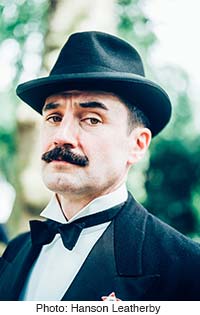
With a few days to go before a further easing of lockdown restrictions, the subject of this week’s interview is keenly looking forward to the opening of venues in which to enjoy live performances. Chairman of the famous Shaggy Dog Storytellers, Tristan Langlois is Head of Education and Events at The Royal Armouries in Leeds.
The son of Anglo-French parents, he discusses his early years spent in France and Wales. Tristan explains how his love of storytelling has fed into his work and his Shaggy Dog performances. He discusses his reaction to moving north, handily close to The Stubbing Wharf, and his enjoyment of fell running in the Pennines.
With a degree in medieval languages, he has created an online Book of Hours, translating sumptuously illustrated commentaries on Saints’ Days, and reflects on saints’ intercessions at time of pandemics. Read about Tristan, including his love of improvisation and vintage clothes.
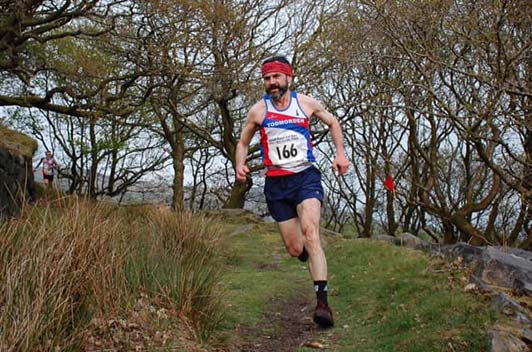
Tristan Langlois Q&A
Where do you work and what is your role?
I’m the Head of Education and Events at the Royal Armouries. That means I run workshops and visits for schools: and daily and special event programmes for everyone else.
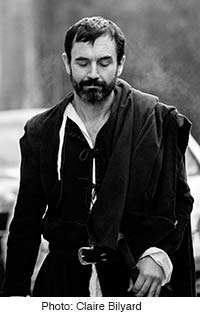 How has museum work been affected by Lockdown?
How has museum work been affected by Lockdown?
It’s been a year of two halves. In the first half, the museum sites were all shut, and we switched all our creative efforts to digital content on social media platforms. Over about a month we turned ourselves into a kind of digital TV company. Exhilarating, and exhausting. The second half was almost the opposite. We opened for a bit, then closed down again, but this time we furloughed staff, and planned, or tried to plan for this year. It was an odd, dark time, a long winter, from which it feels as though we’re only just emerging.
What other jobs have you had since leaving university?
I’ve always worked in heritage interpretation. I ran a commercial company called Past Pleasures that provided education and event services to the heritage sector, Historic Royal Palaces, English Heritage, the National Trust and many others. Lots of travelling. Before I worked at the Armouries, I worked for the National Army Museum, and headed the learning team there.
Can you give us a flavour of your early life and schooling?
Having a British father and a French mother meant that, when my brother and I weren’t at school, we were either spending time in France with relatives, or getting under my parents’ feet at the ruin they’d bought to rebuild in Wales. Both my parents were teachers, so while we weren’t badly off, we weren’t that well off either. I was good at passing exams, which was lucky, because it meant I won a scholarship to an independent school in London.
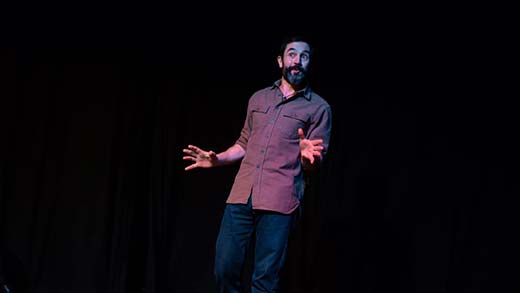
Were you inspired by your time at Cambridge?
I spent a lot of time being moody and doing theatre at Cambridge. It was a great gift.
How did you become involved in storytelling?
When I started with Past Pleasures, with a degree in medieval languages and a flair for performance, we were all storytellers, one way or another. Depending on the client, storytelling was a staple of what we offered, a (deceptively) simple way of plunging audiences into the thought-worlds of the past. As I climbed the slippery pole to the tremendous heights of immense power I now wield as a middle-manager in the public sector, storytelling became something I got other people to do. A few years ago I decided to correct that by getting back into it with my local club in Surrey.
 Where did you meet your wife?
Where did you meet your wife?
We met when dancing in the Great Hall of Henry VIII, Hampton Court Palace.
Has your family enjoyed the move to the north?
Yes. Welcoming, talented people; amazing landscapes. What’s not to love?
You cut a dash. Where do you get your clobber?
Charity shops in the 1990s, before vintage became fashionable (and unaffordable).
What makes you laugh?
Proper clowning. Laurel and Hardy. Buster Keaton. There’s a man called Tom Fermor who trained with the amazing Pete Cooper, a professional ‘fool’ for the heritage sector. I watched Tom once heading to do a show at work about Will Somers, Henry VIII’s fool. Simplest of gags, he had too many props, and kept dropping them. The show itself was quite short, but it took him about 20 minutes just to get on stage. It was one of the most painfully funny things I’ve ever seen.
What are the rewards of fell running?
Once in a while, you feel the flow. Earth, sky, feet, heart, all combine so you’re a part of everything, and everything is a part of you. That and the occasional bottle of beer.
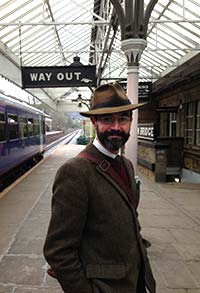 I’m intrigued by your interest in improvisational performance. Can you give us a flavour of that activity?
I’m intrigued by your interest in improvisational performance. Can you give us a flavour of that activity?
Oooh, that’s hard. Long-form improv is the ultra of performance, 50 hours and 20 performers with little more than a basic scenario and a name. It’s like binge-watching all seasons of your favourite series, except you’re performing, and creating it, as you go along. Check out the Showstoppers to get a sense of the incredible talent of some of the actors.
Does confidence in improvisation feed into your museum work and storytelling?
Yes, though in a way, I’ve always been an improvisational storyteller, I just didn’t know that’s what it was called. So I guess all these things have fed into each other.
I enjoyed reading your series of posts on Saints’ Days. You seemed to find new ways of presenting religious themes - mind you the ravishing illustrations helped. Can you choose a Saint who met the challenges of previous pandemics?
You know I’m still going, right? I created an FB page called Book of Hours, and 150 odd (some very odd) saints in I’m still plugging away. Pretty much all saints rose to challenges, that’s a criterion for becoming a saint. There are any number of saints whose intercession was and is sought against pandemics, so I’m going to cheat and pick the Fourteen Holy Helpers, a sort of sanctoral A-Team that included Blaise, Cyriacus, Erasmus, George, Giles, Pantaleon, Vitus, Agathius, Barbara, Catherine of Alexandria, Christopher, Denis, Eustace and Margaret of Antioch.
What are you most looking forward to when Lockdown ends?
Live performance of any kind, as a performer or as an audience member, I don’t care.
Finally, Tristan, can you choose a video of storytelling, music or improvisational work to amuse or inspire us?
More HebWeb interviews from George Murphy
If you would like to send a message about this interview or suggest ideas for further interviews, please email George Murphy

